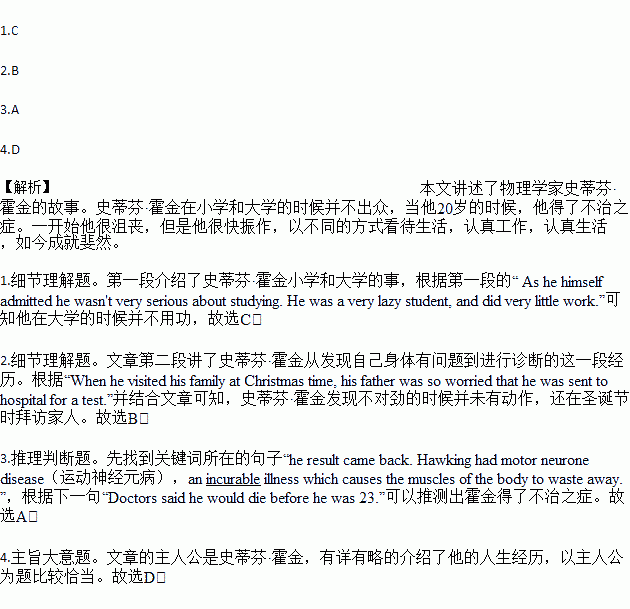题目内容
Stephen Hawking was born in Oxford, England on 8th January, 1942. He went to school in St. Albans—a small city near London. Although he did well,he was never top of his class. After leaving school, Hawking went first to Oxford University where he studied physics,and then he went to Cambridge University where he studied cosmology (宇宙学). As he himself admitted he wasn't very serious about studying. He was a very lazy student, and did very little work. However, he still achieved extremely good marks.
Hawking first noticed something was wrong with him at the age of 20. He started to bump into things, and often fell over for no reason. When he visited his family at Christmas time, his father was so worried that he was sent to hospital for a test. Finally, the result came back. Hawking had motor neurone disease(运动神经元病),an incurable illness which causes the muscles of the body to waste away. Doctors said he would die before he was 23.
At first, Hawking became extremely depressed(忧郁的). After a while, though, he began to see his life in a different way. As he later wrote, “Before my illness had been diagnosed(诊断),there had not seemed to be anything worth doing. But shortly after I came out of hospital. I suddenly realized that there were a lot of worthwhile things I could do.” Hawking married, found a job at Cambridge University, where he still works today, and had three children. He also went to do some of the most important scientific research ever carried out.
His story shows that nobody, however bad their situation is, should lose hope. “Life is not fair,” he once said, “ You just have to do the best you can in your own situation.”
1.As a university student, Stephen Hawking ________.
A. worked extremely hard
B. studied maths and chemistry
C. was lazy and did very little work
D. only achieved average marks
2.Hawking first noticed something was wrong with him when________.
A. he visited his family at Christmas time one year
B. he was 20
C. his father made him see a doctor
D. he was sent to hospital for a test
3.In the passage the underlined word “incurable” means“________”.
A. untreatable B. uncommon
C. complicated D. unknown
4.What might be the best title of this passage?
A. A lazy boy B. Life is Fair
C. Motor Neurone Disease D. Professor Stephen Hawking
Sometimes we can get so caught up in the stress and worry of our personal lives that our minds become too confused to operate effectively.This is especially dangerous in a test-taking situation.After hours of reading and studying,our brains can lock up in a state of overload.
In a stressful situation it's often a must to clear your mind completely to allow your brain to refresh itself and recalibrate all of its functions.But when you're tense,clearing your mind isn't so easy!Try this relaxation technique if you think your brain has seized up from information overload.
1.Set aside at least five minutes for quiet "clearing" time.If you're at school,see if you can put your head down somewhere or find an empty room or quiet space.If necessary,set a watch (or phone) alarm or ask a friend to tap you on the shoulder at a designated time.
2.Think of a time or place that puts you into a complete state of peace.This place will vary from person to person.Have you ever sat on the beach watching the waves come in and realized you've "zoned out" fora while?This is the sort of experience you're looking for.Other experiences that make us zone out could be: Sitting in the dark and staring at Christmas tree lights—remember how peaceful that feels?
3.Cover your eyes and go to your "place".If you are at school preparing for a test before class,you may simply rest your elbows on the desk and put your hands over your eyes.For some people,it may not be a good idea to put your head down.(You might fall asleep!)
Don't let any thoughts creep into your head.As soon as you start to think about a test problem,clear away the thought and concentrate on your peaceful place.
4.Snap out of it!Remember,this is not nap time.The point here is to refresh your brain.After five or ten minutes of clearing time,take a brisk walk or take a drink of water to re-energize your mind and body.Stay relaxed and resist the urge to think about the things that are stressing you out or clogging your brain.Don't let your brain go back to freeze-out.
Now go on with your test or study session refreshed and ready!
Title: How to clear your mind to stay relaxed? | |
Present situation | ●We are stuck in stress and worried about our personal lives,stopping our brains working1.. ●If you feel stressed,it's often2.to clear your mind to leave your brain refreshed. |
3.to clearing your mind | 1.Set aside at least five minutes for quiet "clearing" time. ●When at school,see if you can put your head down somewhere or stay in a quiet space. ●If necessary,set a watch (or phone) alarm or ask a friend to tap you on the shoulder at a designated time. |
2.Think of a time or place allowing you to feel completely4.. ●This place will vary from person to person. | |
3.5.your eyes and go to your "place". ●When making6.for a test at school,you could cover your eyes with your hands to have a rest. ●If you put your head down,you will fall7.. ●Make sure not to be8.by any thoughts and concentrate on your place. | |
4.Snap out of it! ●Clearing time does not9.nap time. ●Stay relaxed and avoid the things that made you stressed out. | |
Conclusion | It's time you10.your test or study session refreshed and ready! |

